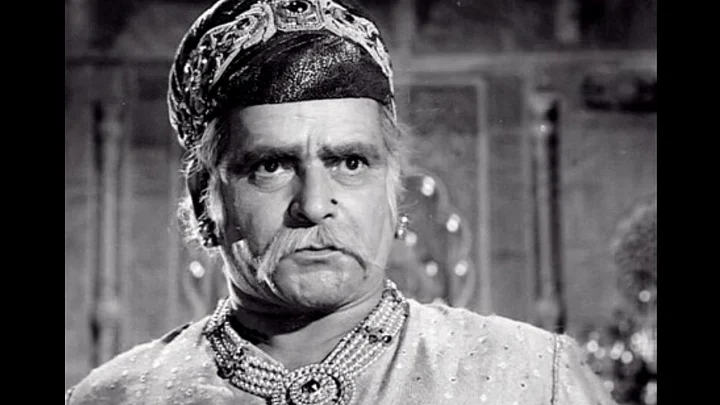Around forty five years ago, a towering personality of Indian theatre, Prithviraj Kapoor, passed away leaving behind a legacy that fortunately has not been consigned to the bins of history. Prithvi Theatre in Juhu, Mumbai keeps his memory alive.
Prithviraj was one of those rare actors whose first love continued to be theatre even after he became a popular star on the silver screen. Alam Ara (1931), the first talkie, boasted of his name as did historical films like Sikander (1941) and Mughal-e-Azam (1960), in which his booming voice was well used for dramatic confrontation scenes.
In the 30s he worked with New Theatres in Kolkata, donning the garbs of Ram in Seeta (1934), and a court poet in Vidyapati (1937). In Bombay, one of his most well-remembered roles was of a haughty judge in Awaara (1951) where his scenes of conflict with his son Raj Kapoor made for very moving cinema.
Prithviraj could have sat back and basked in the popularity of his screen career. Instead, he chose to plough the money earned from cinema into meaningful theatre. Having started his stage career at an early age in Lyallpur, he decided to form a touring theatre company in 1944, called Prithvi Theatres. Travelling the length and breadth of the country by train with a large contingent of actors, technicians and props, he staged powerful plays on subjects like Partition, the plight of refugees, Pathans, Muslims, destructive development, feudalism and other socially-relevant themes. His repertory became a nurturing ground for talents as diverse as Zohra Sehgal and a very young Shashi Kapoor.
Shashi Kapoor, once, narrated to this writer how he learnt everything about theatre from scratch in his father’s company. “I started by playing the roles of ‘extras’. By the time I turned 18, I had graduated to becoming a stage manager and playing a little more fleshed-out roles.”
The fact that he was the owner’s son gave him no special benefit and he roughed it out like the others, sharing rooms with half a dozen other guys. Prithviraj, too, did not enjoy any special privileges, travelling with his troupe in third-class compartments when he could have utilized his Rajya Sabha membership to travel more comfortably. Those were intoxicating times, when the pure love of theatre and a desire to rid the country of social evils drove Prithviraj and his team to put up, uncomplainingly, with physical discomfort.
Sadly, cinema which, initially, allowed him the luxury of doing theatre, later led him to shutting down Prithvi Theatres. The soaring popularity of the silver screen weaned away audiences from theatre and Prithviraj found it impossible to run his large company.
“When my father dissolved his company, there were three wagonloads of costumes, props, lights etc. He stored them all in a shed opposite the cottage where he lived in Janki Kutir, Juhu. He would always say, ‘One day I will build a small theatre which will make it economical for theatre companies to run.’ But dad passed away in ’72 before he could realize his dream of setting up such a theatre”.
– Shashi Kapoor
So Shashi and his wife Jennifer decided to turn his dream into a reality. Like his father, Shashi used the money from his film career to build a vibrant centre for drama on the same plot where the shed stood. On November 5, 1978, the doors opened for two one-act plays by Naseeruddin Shah and Om Puri. There were no tickets. During the interval a box was passed around for viewers to put in whatever they could afford.
Jennifer was a hands-on manager, always there to ensure everything ran to clockwork precision, and at the same time infusing the place with so much warmth and affection that it soon became a second home, perhaps even first, to all theatre lovers. Over endless cups of tea, aspiring writers, directors, actors would passionately discuss theatre in its open-air café.
After providing more than five years of the most wonderful theatre experience to the city, Jennifer passed away. In 1993, her daughter Sanjana took on the responsibility of continuing her mother’s good work. A few years ago, she handed over the reins to her brother Kunal while she moved on to establishing Junoon, a roaming theatre and arts company.
Just like grand-papa.
It is an inheritance that must sit heavily on her shoulders, but Sanjana reveals what it means to her. “One thing I learned from my father, which he learned from his father, Prithviraj Kapoor, was that if you have benefited directly from the public at large, then it is incumbent on you to give back to society. Not many people know that Prithviraj Kapoor established his theatre company at the peak of his film career, in 1944. And he toured India with Prithvi Theatres for 16 years, taking meaningful theatre to the masses, having full faith in the transformative power of theatre, over film. And this is what he said in Parliament in1952:”
“Theatre is a wonderful thing. It is the greatest temple on earth. In that temple Hindu, Muslim, Christian, Jew, Sikh and Parsi all get together. Nobody comes and asks who is in the next chair. A pandit sits with a mulla, a communist friend may sit with a socialist friend. All sit together That is a beautiful way of bringing people together and teaching them how to behave. They laugh together, they cry together. It is the biggest temple that could be built for the benefit of the nation”.
– Prithviraj Kapoor
Prithviraj Kapoor’s words continue to be relevant, even today.
(This story is from The Quint’s archives and was first published on 29 May 2015. It is being republished to mark the death anniversary of Prithviraj Kapoor.)
(The writer is an independent journalist and author of biographies on Madhubala and Dev Anand.)
(At The Quint, we question everything. Play an active role in shaping our journalism by becoming a member today.)
